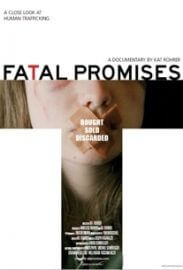
https://www.filmplatform.net/product/fatal-promises
Unlike any fictionalized treatment of trafficking in human beings, the documentary looks at the issue from a variety of angles. It follows the paper trail of resolutions, recommendations and conferences to the point where action should be taken but is not. It explores the legal, political, and personal struggles of those engaged in the fight against Trafficking in Human Beings. In the end, we hope that answers have been provided to our original question so that the audience is moved to demand action by raising its voice on behalf of the modern day slaves

The first time I consciously read anything about Human Trafficking was an article in the New York Times in 2005. I was so deeply moved and angered by what I read that I decided to do research on the topic. The more I read the more questions popped up in my head and the more interested I became in the issue. I started to feel the urge to do something about this problem the only way I know how to – through film. I had personal contact in Ukraine and started to focus on this interesting country as a country of origin and the US as a country of destination. At first, my intent was to capture the realities of these unfortunate women, who fall victim to these schemes and deceptions that brought them into a situation of being trafficked into to lives of sexual exploitation. However the deeper we looked the more we found.
I have been working on “Fatal Promises” for more than three years. During that time, my crew and I have traveled to Ukraine, Slovakia, Austria and throughout the US. We met with NGOs, the International Organization of Migration, UN representatives, former Ambassadors of the US, experts, activists and, most importantly- Victims, both male and female. As a result of these interviews, my concept for this film shifted from telling the horrifying stories of victims showing how we as a society are failing our fellow human beings and tolerate, manly through ignorance and apathy, modern day slavery of women, children and men.
Through “Fatal Promises” I want to expose how the politicians in power in both the developing as well as the developed countries pay more lip service than action to the demands of NGOs struggling to get laws passed and help the victims of this horrific crime. The survivors I met and with whom I have spoken are truly remarkable people who have been through ordeals we could not even imagine. It is their voices and their anger that I want the public to hear in this film. I want to put their questions to those who have to pay attention to them: governments and politicians. How can we tolerate slavery in 21st century?
I fully realize that the world community is faced with a myriad of tough issues, from hunger to war and disease, but this crime of modern day slavery not only violates our basic human right of freedom but also our dignity as a civilized society.
My duty is to those survivors who shared their stories with us and who were brave enough to step forward and tell their stories. I hope that “Fatal Promises” will do it’s part in helping to fight this horrific crime that should no longer exist in this time in age.
– Kat Rohrer
Fa•tal: adj- causing ruin or destruction; disastrous
Prom•ise: noun- something that has the effect of an express
assurance; indication of what may be expected
Human Trafficking is defined as the recruitment, transportation and harboring of
persons, by means of threat of violence, use of force, coercion, abduction, fraud, or
the abuse of power for the purpose of sexual exploitation or labor servitude.
Every year, an estimated 800,000 human beings are trafficked across
international borders from countries of origin to countries of destination. It is a
multibillion-dollar global criminal enterprise, third in size after drugs and arms
smuggling.
Through personal stories by victims of trafficking, and interviews with politicians,
Non Governmental Organizations (NGO’s) representatives and activists, Fatal
Promises provides an in depth look at the realities of human trafficking suffered by
victims and struggled against by NGO’s and activists versus the rhetoric of politicians
and pundits who claim to be making significant strides into combating this horrific
crime against humanity.